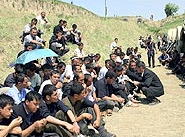
KYRGYZSTAN EXTENDS RELUCTANT WELCOME TO UZBEK REFUGEES
Publication: Eurasia Daily Monitor Volume: 2 Issue: 98
By:

Reports about the number of Uzbeks fleeing the Andijan and Pakhtaabad massacres for southern Kyrgyzstan range from 500 to 6,000. Kyrgyz Ombudsman Tursunbai Bakir predicts the refugee flows will increase up to a million if the Uzbek conflict continues to intensify (Akipress, May 17). It is difficult to estimate the real scope of interstate migration following the bloody events in Uzbekistan because the Kyrgyz-Uzbek frontier is several hundred kilometers long and densely populated. It is likely that Uzbek citizens from other parts of Uzbekistan migrated to Kyrgyzstan as well.
At a May 17 press conference Uzbekistan’s President Islam Karimov said that many insurgents slipped into Kyrgyzstan along with civilians. Karimov suggested that the Uzbek border guards in Karasuu did not halt the flow of people in recent days in order to avoid human causalities, “Since women, children, and elders were among them.” He also is careful of the terminology used for the Uzbeks entering Kyrgyzstan: “I don’t consider them refugees. On what basis do they call themselves like that? Is it some kind of a sect, some Mormons in the state of Utah?” (Fergana.ru, May 18).
Official Kyrgyz militia records reveal that former inmates from the Andijan prison have entered Kyrgyzstan. Several dozen guns and submachine guns were taken from Uzbek immigrants. At the same time it is unclear how many Uzbek refugees were directly involved in the Andijan or Pakhtaabad riots. But refugees are revealing new details about their escape. They claim that not all of the refugees from Andijan, located forty kilometers away from Kyrgyzstan, were able to reach the Kyrgyz border, because dozens were killed or injured by Uzbek military. Many of the refugees do not wish to return to Uzbekistan, some have already applied for political asylum in Kyrgyzstan.
Kyrgyz officials have avoided granting any formal status to the Uzbek immigrants, delegating responsibility to international organizations such as the Red Cross, UN, and OSCE. The head of the Kyrgyz Border Service, Colonel-General Myrzakan Subanov, thinks that bilateral treaty on “Eternal Friendship” obligates the Kyrgyz side to return the Uzbek citizens.
However, Uzbekistan has infringed this treaty many times. During the Batken conflicts in 1999-2000, Uzbek security structures conducted unsanctioned military actions on Kyrgyz territory. Uzbekistan has mined the borders with Kyrgyzstan and Tajikistan and in recent years shot dead dozens of Kazakh, Kyrgyz, and Tajik citizens at border areas. Uzbekistan also was the only Central Asian state to completely close the border to Kyrgyz citizens for several days during the March revolution. Some Kyrgyz experts predict the Uzbek government may take further unilateral actions inside Kyrgyzstan if the Uzbek refugees remain in the country.
Karimov has chosen to equate all Andijan protestors with terrorists to justify the killing of hundreds, and he is also blaming the Kyrgyz government for hosting criminals. At the same time, if the Kyrgyz government rejects Tashkent’s official position, Uzbekistan might impose economic sanctions against Kyrgyzstan. Acting President Kurmanbek Bakiyev has already made a statement supporting Karimov, saying that bloody events were organized by terrorists (Akipress, May 18). However, the Kyrgyz government will also face widespread popular criticism if the refugees are forced back to Uzbekistan.
Kyrgyz human rights activists have appealed to the government to allow the Uzbek refugees to remain inside Kyrgyzstan for the duration of the tensions in Uzbekistan. “The Kyrgyz government by no means should allow the extradition of peaceful citizens, including those injured, back to Uzbekistan,” according to the activists (Kabar, May 17). Several think tanks agree, noting, “Only by showing kindness and realizing its international responsibility can the Kyrgyz government confirm its long-term interest in the Kyrgyz-Uzbek friendship.”
The Andijan and Pakhtaabad massacres have provoked discussions in the Kyrgyz parliament about the need to improve communications between Kyrgyzstan and Uzbekistan in order to increase local trade. The local bridge rebuilt within several hours for Uzbek refuges in Karasuu not only helped civilians escape from Uzbekistan, but it also instantly boosted inter-state trade in fruits and vegetables. After meeting with Uzbek and Kyrgyz citizens in Karasuu the Kyrgyz Ombudsman asked parliament to provide all possible means for facilitating trade at border areas: “This would accord with the hopes of ordinary Kyrgyz and Uzbek citizens” (Kabar, May 17). There are already thousands of Uzbek and Tajik seasonal workers in southern Kyrgyzstan.
Kyrgyzstan has a long history of accommodating large flows of refugees. During the civil war in Tajikistan about 20,000 Tajiks fled to Kyrgyzstan. Several thousand refugees from Afghanistan moved to Kyrgyzstan in the 1980s and 1990s. Many of the Tajik refugees were repatriated to Tajikistan after the peace accord was reached between the government and opposition in 1997. However, it is also evident that many refugees see Kyrgyzstan as a transit point en route to Russia, Europe, and North America.
Popular attitudes toward human-rights abuses in Kyrgyzstan changed following the Aksy riots in March 2002, when six civilians were shot dead by law-enforcement agencies. The incident provoked a deep and lasting political crisis in the country, and many local NGOs openly criticized President Askar Akayev’s politics and the Kyrgyz security structures. Some experts believe that the March Tulip Revolution was the culmination of public dissatisfaction with the government’s actions in 2002.
Kyrgyz NGO representatives do not think that the Tulip Revolution in Kyrgyzstan was the main reason for the Uzbek uprising. Civil society activists such as Edil Baisalov, president of the Coalition for Democracy and Civil Society, discount Karimov’s accusations that residents of southern Kyrgyzstan inspired Uzbeks to revolt against the government. Rather, the Karimov regime’s total suppression of civil society and mass media led to the devastating clash between impoverished crowds and armed government.




